











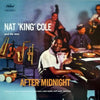
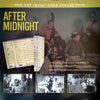
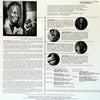



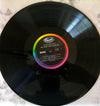
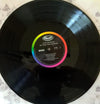

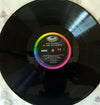

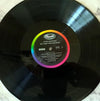
Nat King Cole - After Midnight (3LP, 45 tours, Mono)
John Collins (Guitar), Charlie Harris (Bass), Lee (Leonidas) Young (Drums), Willie Smith (Alto Saxophone), Harry "Sweets" Edison (Trumpet), Stuff Smith (Violin), Juan Tizol (Trombone), Jack Costanza (Congas,Bongos)
3 LPs, standard sleeve, 6-Panel Booklet with Photos & Essays by Chris Hall & Michael Fremer
Original analog Master tape : YES
Heavy Press : 180g
Record color : black
Speed : 45 RPM
Size : 12'’
Mono
Studio
Record Press : Quality Record Pressings
Label : Analogue Productions
Original Label : Capitol
Produced by Lee Gillette
Tracks :
1. Just You, Just Me
2. Sweet Lorraine
3. Sometimes I’m Happy
- Caravan
- It's Only a Paper Moon
- You are looking at me
- The Lonely One
- Don’t Let It Go To Your Head
- I Know That You Know
- Blame It On My Youth
- When I Grow To Old To Dream
- Route 66
- Candy
- What Is There To Say
- I Was A Little Too Lonely (And You Were A Little Too Late)
- You Can Depend On Me
- Two Loves Have I
- Just You, Just Me (Take 1)
- It's Only a Paper Moon (Take 3)
"...in terms of sound, the originals are a distant second to these 45rpm LPs. Cole's voice is up front, and the accompaniment, especially the massed strings, has a colorful vividness. After Midnight was recorded in mono, and it is among the very best 1.0-channel reissues. Played with a mono cartridge, it displays intimacy and tonal purity that must be heard to be believed." - Marc Mickelson, The Audio Beat, September 2010
“Glenn Wallichs would be proud. Proud and no doubt astonished to find in 2010, 39 years after his death and 68 years after he helped co-found Capitol Records with tunesmith Johnny Mercer and songwriter/Paramount Pictures executive Buddy DeSylva, that a substantial portion of Nat “King” Cole’s Capitol Records recorded output would once again find its way onto “wax,” or more accurately, 180 gram premium virgin vinyl.
After all, Wallichs was, above all else, a “record man.” His record store Music City, opened at the iconic corner of Sunset and Vine in 1940, was for decades, until its closing in 1978 seven years after Wallichs’ passing, Hollywood’s premier music retailer. It was during a visit to Music City back in 1942 that Mercer first announced to Wallichs his record label idea, along with his hope that the retailer would run the business side of the enterprise.
A few months later Mercer supervised the new label’s first recording session. Shortly thereafter, Wallichs handed an L.A. DJ a free copy of an upcoming release, thus inventing the “promo record” concept. In July of 1942 Capitol released its first nine records and the rest, as they say, is history.
Were Wallichs able to fast-forward to 2009, he’d find still standing, Hollywood’s Capitol Records tower, opened in 1956 and soon nicknamed “The House That Nat Built” because of the artist’s prodigious hit making and record selling abilities. Up the road in Camarillo, Wallichs would find Kevin Gray and Steve Hoffman busy at AcousTech Mastering, further burnishing Nat “King” Cole’s legend, painstakingly readying for release on both vinyl and SACD, seven of the singer/pianist’s most desirable albums under the watchful ear of 21st Century “record man,” Chad Kassem.
Using the original three-track work tapes obtained from Capitol’s vaults (with the exception of After Midnight, which was originally recorded only monophonically), the team twice produced new stereo mixes, once for the 45-RPM vinyl editions and again for the SACDs. Twice, because rather than mixing down to stereo analog tape and mastering each format from the two-channel mixdown, the team decided to mix “live” directly to each format from the three-track work tapes, both to save a generation loss and because the early days of stereo produced mixes that often sound primitive and extreme to modern ears, with exaggerated separation and excess reverberation.
In addition to the “live” stereo mixes, the SACDs include three-track transfers (produced by DSD specialist Gus Skinas) for multichannel system playback and the original “live” mono mixes derived from separate microphone feeds, mixing consoles and tape recorders at the original sessions. The monophonic-only After Midnight SACD includes bonus material for a total of 18 tracks.
Working from the three-track tapes required reformatting “stereo friendly” AcousTech for three-channel playback. That meant obtaining a third identical monitoring channel chain (mixing board, amplifier and speaker) as well as a threetrack playback headstack and associated electronics for AcousTech’s Studer mastering deck. It also required adding a three-track preview head and associated electronics for the vinyl cutting system, required to give the lathe advance warning so it can adjust the groove pitch to accommodate louder musical passages and sudden dynamic swings - and you can bet these Capitol work tapes contain plenty of those!
Easier said than done, however: expensive, custom triple head stacks had to be ordered and built for the vintage Studer deck. Kevin Gray had to call in all sorts of favors to obtain the third channels of Studer preview and playback electronics, which then had to be extensively and meticulously modified to precisely match the existing two channels.
Finally, since no digital reverb would touch this purist project, an analog echo chamber had to be created that could replicate, or at least do justice to the legendary ones located under the Capitol Studios parking lot used to add “wet” to so many legendary recordings. According to Steve Hoffman, the new one sounds “just like the old Capitol echo chamber.” In fact, Hoffman added, both he and Kevin Gray think they sound even better!
An analog echo chamber means using a loudspeaker and a microphone and a microphone means it would pick up outside noise along with the music playback, so, according to Hoffman, they “…had to clear out all the workers from our part of RTI (the record pressing plant in which AcousTech is located) because having them walk in the general area of the chamber made noise on the recordings.
All drilling, machine stamping, etc. had to stop during our mixing sessions. They hated us after a while, but it worked. The reverb is full, rich and analog-sounding, but not overpowering. Perfect for Nat.”
Upon unboxing the monophonic and three-track tapes, Gray and Hoffman found reel after reel of perfectly preserved, rarely played Scotch 111, either ¼” or ½.” Because these were work tapes, virtually every song began with a conductor’s countdown as well as false starts, musicians’ “clams” (mistakes) and other problems requiring a re-do.
There were also many unreleased alternative versions. Hoffman says that listening to the studio chatter made clear the warmth of Cole’s relationship with best friend and producer Lee Gillette. Hoffman says that while Cole occasionally forgot the lyrics, he never hit a wrong note adding, “amazing how he could do it take after take, so effortlessly—no headphones, no overdubbing. Just live performances with orchestra. Very much a style ofrecording that is gone forever.”
Throughout the mixing and mastering process including studio eavesdropping was a tempting option but only a limited amount made its way to disc so as not to overwhelm, or worse, distract from the magic produced by what you were meant to hear.
Listening to these classic Nat “King” Cole albums is sure to thrill even long-time owners of the originals. So much more immediate, dimensional, transparent and dynamic are these new editions. In the case of those mastered from three-track tapes they are a generation closer to the original. And all of them have been produced with a level of meticulousness nearly impossible during the era of mass produced vinyl.
Compared to the reverb-drenched, watery and distant sounding original stereo records, Hoffman and Gray introduce just a “kiss” of echo chamber and no more. Enough to pleasantly wet down the aural landscape (much like they always wet the visual one before shooting an automobile commercial), but not so much that it splashes in your face.
The result is a thrillingly intimate and honest sonic window that still maintains a respectful distance between listener and performer. These Nat “King” Cole reissues are magical time machines that will transport you back to Capitol Studios in ways the distant, compressed and obscured by reverb original stereo editions do not. The original,rich sounding monophonic After Midnight seemed impossible to improve upon, but the AcousTech team did.
“My ambition is to be able to sit back and appreciate myself as a person as well as a performer,” Cole tells George T. Simon in the original The Nat King Cole Story annotation, adding, “Once you can see people respecting you for what you are, then you begin to feel that everything you’ve done has not been done in vain.”
So, yes, Capitol founder Glenn Wallichs would be proud of these historic reissues, but no doubt, so would the great Nat “King” Cole, who passed away in 1965 at the age of 45. As Simon concludes in his notes, “The evidence speaks for itself.”” Michael Fremer



